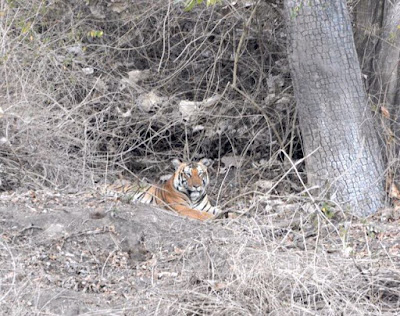Blessed as we are to have visited most of the Tiger sanctuaries in Karnataka, we realized over time that most naturalists and promoters of ecotourism in India have a single-minded obsession – spotting the majestic tiger. Although still on the endangered species list, it's heartening to know that the tiger population in India has grown substantially over the last few years. What’s disheartening, however, is that in a bid to save the tiger, other critical species, which aren’t necessarily on the endangered list, are often ignored.
On our recent trip to the Bandipur Tiger Reserve, we informed the naturalist that we’d like to observe all animal and bird species, to which he raised a quizzical eyebrow and asked us if the striped feline wasn’t on our list. Well, of course, it was. We’d love to observe a tiger in its natural habitat, as we’ve done many times before, but we’d also like to take in the different sights and the sounds of the jungle.
We started off on a cold January morning. As we ambled along, our naturalist pointed to our right and whispered excitedly, “There’s Mahadesha!” Following his gaze, I expected to see someone from the anti-poaching squad walking along the fire trail. What I saw made my jaw drop. There he was, a fully grown male tiger, lazing around in a nearly dry water hole. The excitement in the safari jeep was palpable, the cameras clicking away furiously. After clicking some pictures, I put the camera aside and watched ‘Mahadesha (also known as the Basavanna Katte male)’ yawn and stretch. He rose in all his magnificence and melted into the thicket, as we continued to gaze at the spot where he’d just sat. It was an excellent day indeed, and we were just getting started.
It was around 4 in the evening and the naturalist told us that it’s unlikely that we’d spot anything at this time of the day. Indeed, the part of the jungle that we were to cover that evening lacked the usual deer and langur population, and we were quite certain that this wouldn’t be anything more than a peaceful drive in the wilderness. The drive was lulling me to sleep, and the delicious lunch a few hours before didn’t help. Just as I was about to slip into a sweet slumber, one of the guests exclaimed, “Leopard, leopard!”
I was instantly awake. Indeed, less than 70 meters from our jeep was a fine male leopard out on his post-lunch stroll. Leopards are shy and difficult to spot in the wild, so we were fortunate to have seen this one up close. His movements unhurried, his body sinewy, the spotted, smaller cousin of the tiger gave us a cursory glance before doing the vanishing act. But my excitement isn’t something everyone will share. Considered a nuisance by many, leopards are vital to maintaining the ecological balance. While studies show that there are four leopards for every tiger in India, the alarming reality is that these cats are often poisoned, trapped in snares, or simply shot. The future perhaps isn’t as grim for the leopard is it appears for the tiger, but at the rate at which these creatures are dying, I certainly hope they don’t meet the same fate as that of the tiger.












